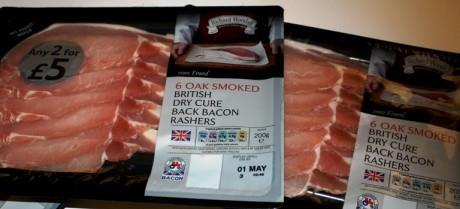Shoppers could be forced to fork out up to 60p more for a packet of eight sausages, 70p more for a standard pack of bacon or a whopping £2.50 extra for a pork roasting joint within months if mounting losses force more pig farmers out of business, according to BPEX.
'The Impact of Feed Costs on the English Pig Industry' report explains how small increases now in the price shoppers pay for pork, bacon, sausages and ham will keep farmers in business and stave off these massive price increases according to a report from BPEX. The report shows how modest retail price rises of as little as 7 to 14p on a pack of bacon today could keep responsible pig farmers who meet Red Tractor Assurance standards in business and avoid bigger price hikes for shoppers in the future.

Consumer research also published by BPEX suggests that consumers would be supportive of modest price rises with nearly two-thirds of people agreeing that it is right for shoppers to pay a little more for pork, bacon and sausages if farmers’ costs have increased.
Crop production around the world has been significantly affected by drought, driving up the cost of pig feed. Typically feed makes up 60 to 70 per cent of pig farmers’ costs, but dramatic price increases in the past months mean that pig farmers’ cost of production has soared to £1.70 per kilo. With the current price paid to farmers around £1.55 per kilo they are currently losing approximately £14 per pig reared. Without a price increase losses for the industry are set to hit £100 million over the next six months with many farmers likely to be forced out of business.
Estimates from BPEX suggest that without price increases, the pig herd in the UK and across Europe could be cut by 8 to 10 per cent over the coming months as farmers cut back production or are forced out of business.
A recent reduction in herd size in Germany of four per cent led to a 26p price increase per kilo paid to farmers. An eight per cent decrease could therefore lead to a price increase of around 50p per kilo. When translated into retail prices this would mean an increase of up to £1.40 on a pack of four pork chops, £2.50 on a leg roasting joint, 60p on a pack of sausages, 70p on a pack of bacon or 45p on a pack of sandwich ham.
BPEX’s report shows how a far more modest increase of 10p now would help pig farmers to break even. This would result in an increase of just 16 to 28p in the retail price of a pack of pork chops, 6 to 12p on sausages and 7 to 14p on bacon.
Research conducted by YouGov for BPEX suggests consumers appreciate the need for small price increases. When told about the current problems facing pig farmers, 64 per cent of people agreed it was right that shoppers should pay a little more if farmers’ costs have gone up.
When told about the standards of animal welfare, traceability and food safety under the Red Tractor scheme 56 per cent of shoppers said they would be prepared to pay a little more for pork, bacon or sausages produced responsibly by Red Tractor farmers. 69 per cent agreed that supermarkets should continue to support Red Tractor pig farmers and resist switching to supplies of cheaper imports which could be produced to lower standards. And 69 per cent of people also agreed that supermarkets should pay a little more for pork, bacon, sausages and ham to help Red Tractor pig farmers through the current crisis.
Andrew Knowles, BPEX head of communications and supply chain development said: “Cost of production has soared due to big increases in feed cost and yet again pig farmers are facing big losses. But a relatively modest increase of just a few pence now on the retail price would cut farmers’ losses and prevent massive increases to shoppers next year if pig production drops.
“It’s a difficult time to be talking about price increases with many consumers feeling the squeeze, which is why it’s so gratifying to see that consumers appreciate the need for small price increases and the majority are happy to pay a little bit more for pork, bacon and ham, produced responsibly by Red Tractor farmers.”
This story was originally published on a previous version of the Meat Management website and so there may be some missing images and formatting issues.












